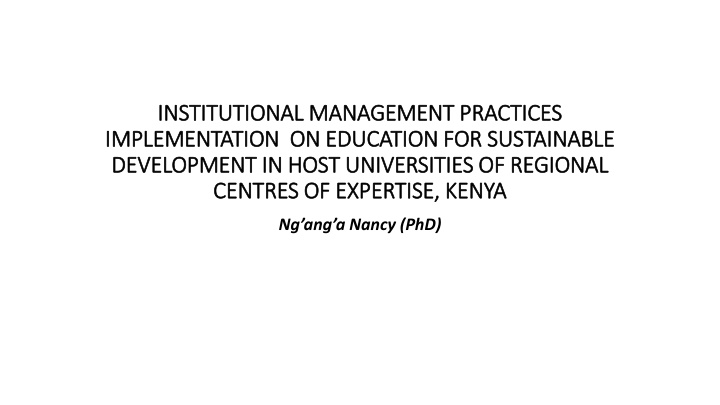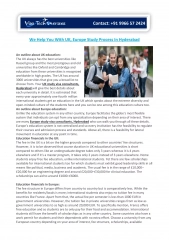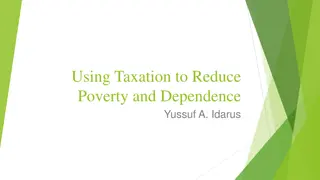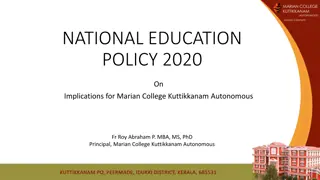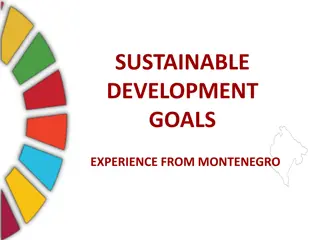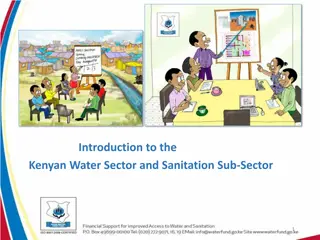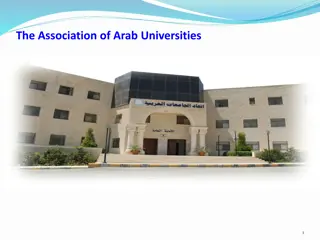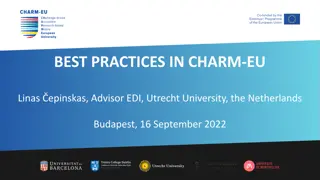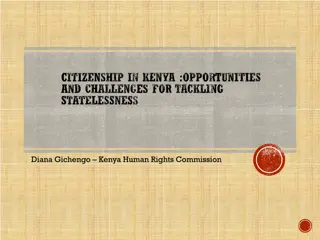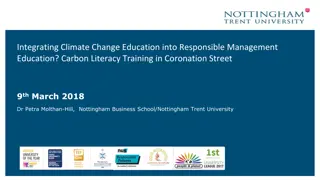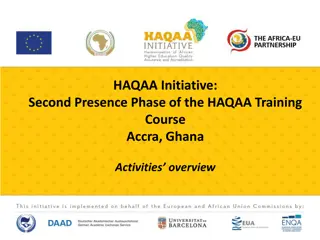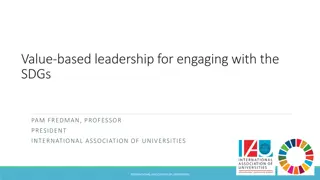Implementation of Institutional Management Practices on Education for Sustainable Development in Kenyan Universities
This study focuses on assessing the implementation of institutional management practices related to Education for Sustainable Development (ESD) in host universities in Kenya, specifically in Regional Centres of Expertise. The objectives include evaluating governance, collaborations, research and development, transformative education, and government sustainability targets. The research employed a mixed methodology approach, utilizing questionnaires, interviews, document analysis, and observation. The study period was from March 2017 to August 2018.
Download Presentation

Please find below an Image/Link to download the presentation.
The content on the website is provided AS IS for your information and personal use only. It may not be sold, licensed, or shared on other websites without obtaining consent from the author.If you encounter any issues during the download, it is possible that the publisher has removed the file from their server.
You are allowed to download the files provided on this website for personal or commercial use, subject to the condition that they are used lawfully. All files are the property of their respective owners.
The content on the website is provided AS IS for your information and personal use only. It may not be sold, licensed, or shared on other websites without obtaining consent from the author.
E N D
Presentation Transcript
INSTITUTIONAL MANAGEMENT PRACTICES INSTITUTIONAL MANAGEMENT PRACTICES IMPLEMENTATION ON EDUCATION FOR SUSTAINABLE IMPLEMENTATION ON EDUCATION FOR SUSTAINABLE DEVELOPMENT IN HOST UNIVERSITIES OF REGIONAL DEVELOPMENT IN HOST UNIVERSITIES OF REGIONAL CENTRES OF EXPERTISE, KENYA CENTRES OF EXPERTISE, KENYA Ng ang a Nancy (PhD)
BACKGROUND TO THE STUDY BACKGROUND TO THE STUDY Institutional management refers to the effective running of different programmes and activities of an institution (Bliss,2020) Institutional management practices of a university entail the supervision of the three traditional roles of training, research and community outreach. . Importance of education, and in particular ESD, in achieving SDG targets by 2030. Target 4.7 of SDG 4 on education specifically addresses ESD and related approaches. Universities - key partners and hosts have the capacity to use their customary role of teaching, research and community outreach to guide the region to achieve sustainable development through ESD.
1.4 OBJECTIVES OF THE STUDY 1.4 OBJECTIVES OF THE STUDY To determine the extent of governance practice implementation on ESD in host universities of RCEs, Kenya. To establish the scope of collaborations practice implementation on ESD in host universities of RCEs in Kenya. To assess the level of research and development practice implementation on ESD in host universities of RCEs in Kenya. To establish the extent of transformative education practice implementation on ESD in host universities of RCEs in Kenya. To find out the scope of government mandatory sustainability targets performance contracts practice implementation on ESD in host universities of RCEs in Kenya.
Scope of the study This study was conductedto assess the implementation of institutional management practices on education for sustainable development by host universities Regional Centres of Expertise, Kenya. The locale of the study was RCE Greater Nairobi, RCE Mau Complex in Rift Valley of Kenya and RCE Central Kenya. These are hosted in Kenyatta University, Egerton University and Dedan Kimathi University respectively. The population included RCE coordinators, lecturers, performance contracting secretariat and heads of collaborating institutions or their representatives. The study employed a mixed methodology approach using the concurrent model of triangulation with descriptive survey design. Instruments for data collection included questionnaires, interview schedule, document analysis guide and observation guide. The study period spanned from March 2017 to August 2018.
RESEARCH DESIGN AND METHODOLOGY RESEARCH DESIGN AND METHODOLOGY Research methodology mixed - qualitative and quantitative methods Research design - concurrent model of triangulation design QUAN QUAL Qual Data Collection Quan Data Collection Qualitative Data Analysis Quantitative Data Analysis Data Results Mixed (Source: Adapted from Creswell, 2003)
Target Population Target Population
DATA COLLECTION PROCEDURES DATA COLLECTION PROCEDURES Data collection instruments questionnaires, interview schedule, document analysis schedule Phase one: Contacted National RCE coordinator at NEMA Phase two: Visited 3 RCE host universities - Step 1 informal interview with coordinators - Step 2 questionnaire administration to lecturers and PC staff Phase 3: administration of questionnaires to collaborating institutions -semi-structured face to face interview with RCE coordinators Document analysis integrated in all phases.
DATA ANALYSIS DATA ANALYSIS Descriptive statistics - %, frequency distribution, bar graphs and Pearson s correlation (SPSS Version 23). Qualitative data Data sorted and ordered into homogeneous groups. Patterns identified and organized into logical sets that summarized and brought meaning to text
RESEARCH FINDINGS AND DISCUSSIONS RESEARCH FINDINGS AND DISCUSSIONS Questionnaire response rate Sample size Participants Non Response participants rate N= 108 N = 103 N = 5 N= 103 100% 95.37% 4.63% 95.3 %
Objective 1: Governance practice implementation on ESD in host universities of RCEs From the descriptive analysis, 51 (92.76%) lecturers agreed on operationalization RCE governance structure. No RCE office space/equipment except in RCEGN. 19 (66.3%) of the partners indicated that there were no stipulated terms of engagement with the RCE host universities on membership and governance structures. Governance structures established in all the RCEs though not clear to some partners. Stakeholder involvement in collaborative governance. Challenge of mobilisation/inadequacy of funds for RCE activities Level of implementation of governance practice positively impacted on ESD - supported by a strong positive Pearson s correlation coefficient at r=.729
Collaborations practice implementation on ESD in host universities of RCEs Objective 2 Descriptive and thematic analyses agree on host universities facilitation in formation of -new collaborations, facilitation of conferences and workshop Types of links mainly lateral and horizontal Successes:- collaborative activities and projects Challenges: funding, understanding of ESD, joint research projects Need to sensitize both the university and local communities on ESD and the role of RCEs in promoting sustainable livelihoods. The extent of operationalization of collaborations practice by host universities had an impact on the success of ESD as supported by a high correlation value of r=.613
Research and development practice implementation on ESD in host universities of RCEs Objective 3 Descriptive and thematic analysis of the influence of institutional management of research and development practice on ESD implementation in host universities of RCEs revealed an average level of success in this area. Faculty and students encouraged to carry out ESD-themed research - Challenge of funds for RCE research agenda. Low level of ESD-themed research activities. Low level of reporting and dissemination of research findings within the RCEs Challenges - lack of funds, low joint research, low dissemination of research findings Level of R&D implementation had an impact on ESD with medium positive correlation at r =.501.
Transformative education practice implementation on ESD in host universities of RCEs Objective 4 descriptive analysis, 39 (70.9%) respondents agreed that the host universities had well managed transformative education practice in the RCE. Successes cited e.g. introduction of environmental education or sustainability/envt studies as a common course unit, reorientation of curricular, non formal education programs Many challenges cited, e.g. lack of understanding of ESD and RCE concepts, crowded school curricula a hindrance to active learning, no capacity building programs From thematic analysis, challenges cited had hindered full realization of ESD in the host institutions. Need for host university management to support in-service training programs to equip educators with the necessary ESD pedagogies. Need for more sensitization and awareness creation on ESD and the mandate of RCEs. Everage positive correlation between RCE transformative education practice implementation and the level of ESD at r=.502
Performance contracting sustainability targets practice Performance contracting sustainability targets practice implementation implementation on ESD in host universities of RCEs on ESD in host universities of RCEs Objective 5 Objective 5 descriptive and thematic analysis revealed university management compliance with the legal requirements of EMCA(2015). Both analyses concurred on the various aspects of the mandatory environmental sustainability performance contracts by government and the aspirations of the three RCEs which had been prioritized at inception. Key stakeholders of RCE in the host universities involved in drafting the university environmental policy Sustainability areas of focus for the region common to host universities- sustainability targets pc signed aligned to RCE aspirations. ESD awareness creation programs in place Evidence of ESD activities in line with sustainability targets/RCE aspirations e.g. water harvesting, botanical gardens, tree planting, energy saving, waste disposal e.t.c There was a strong positive Pearson s correlation between the level of operationalisation of PCS targets and ESD at r=.712
Summary, Conclusion and Recommendations Summary, Conclusion and Recommendations Summary Governance practice implementation on ESD entailed establishment of some form of governance structure through appointment of RCE coordinators, facilitation of stakeholder meetings, collaborative governance among others. Challenges faced included lack of funds, governance structure not clear to partners which hindered successful ESD activities and programs. Inadequate physical infrastructure/offices etc Implementation of collaborations practice achieved through formation of new partnerships which were mostly vertical and lateral links, collaborative ESD events, workshops and conferences among others. Challenges included inadequacy of funds to undertake joint ESD activities and projects, low enthusiasm and lack of awareness and commitment among the stakeholders.
Summary contd. Low level of research and development practice implementation noted, little emphasis specifically on ESD research areas ,due to inadequate financial capacity to support ESD research and development activities in the RCE, very few joint research projects and need for increased partnerships for locally relevant research projects Challenges included inadequacy of funds specifically for RCE research agenda TE practice implementation on ESD- efforts to reorient education programs in line with ESD, introduction of common courses on sustainability, public understanding and awareness creation forums. Need for capacity building through in-service training of teachers Challenges- low level of understanding of ESD, lack of focus on RCE ESD activities and mandates that would transform teaching and learning in both formal and non-formal education Environmental sustainability PC prioritised ESD, focal areas are in line with RCE aspirations. Host university environmental policy documents well domesticated in the institutions and prioritised ESD.
Conclusion Conclusion Governance practice implementation vital for ESD. More clear governance structures, resource mobilization, autonomy of RCE secretariat to further enhance ESD in the RCE Collaborations and partnerships are key for successful undertaking of ESD activities and projects in the RCEs. There is need for establishment of clear structures of collaborations with ESD players to promote ESD activities and programs in the region as well as promote programs to create awareness about the RCE and ESD concepts. Host universities need to facilitate more joint action research that is applicable to societal issues/problems within the RCE in order to attract funding. Need to identify ESD research themes consistent with national research agenda to attract more research funds from government supported agencies and the private sector. Full realization of transformative education practice not achieved due to inadequate understanding of the principles of ESD. Involvement of partners in the ESD awareness creation programs and activities in both formal and non-formal education settings Environmental policy documents/sustainability targets were in convergence with the goals and aspirations of the particular RCE., thereby contributing to sensitize the university community on ESD. More collaboration between the university PC secretariate and RCE management to enhance the ESD agenda.
Recommendations Recommendations RCE host university managers may need to push for an urgent actualization of the ESD policy document for the education sector by MOE (2017) through programs to build the capacity of educators and trainers on integration of ESD into pre-service and in-service teacher programs as well as faculty training in HEIs. This will also contribute to the attainment of Kenya s Vision 2030 (Republic of Kenya, 2007) and the SDGs. In order to mainstream ESD in the entire education system, the Ministry of Education might consider spearheading a program to identify serving teachers who can be in-serviced and appointed as champions or ambassadors of ESD in primary, secondary and teacher training colleges. This would also be beneficial to the ongoing implementation of the new CBC. The management of host universities may consider putting in place policies to make RCE governance and operations independent from the university through provision of infrastructure and personnel specifically for the RCEs. This would enhance ESD implementation through RCEs Host universities should be more intentional in creating awareness on RCEs and ESD through university community outreach programs in order to build capacity in social learning and networking on ESD. There is need for closer interaction between the RCE management and the host university performance contracting secretariat in order to facilitate continued integration of RCE aspirations in prioritized sustainability targets in order to enhance ESD activities and programs comes in the regions.
Publications Publications Links to Publications 1. Journal of Education, Society and Behavioural Science https://www.journaljesbs.com/index.php/JESBS/article/view/30352 2. Asian Journal of Education and Social Studies https://www.journalajess.com/index.php/AJESS/article/view/30561
THE END THANK YOU FOR LISTENING!
